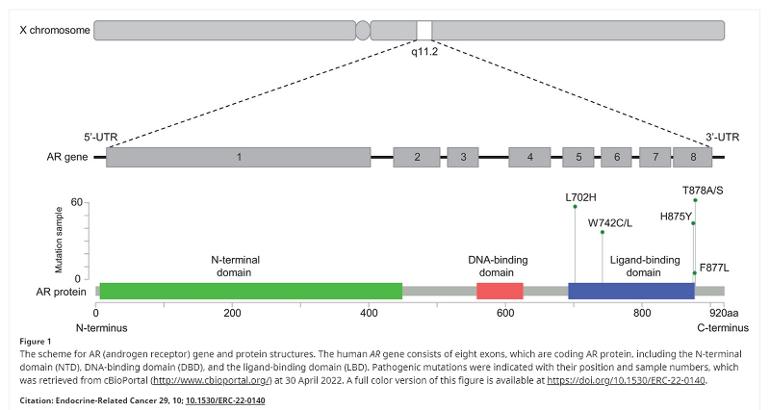This is a very informative research paper on the mechanisms involved with current treatments that target the AR in PCa. Interestingly, it compares/contrast the actions (both as agonistic and antagonistic) of the ADT drugs (Bicalutamid, Flutamide, Enzalutamide, Apalutamide, Darolutamide, & Hydrocortisone) on the AR, as well as mutations that cause them to lose their effectiveness. Very useful information for our patient community.
* * *
Abstract
Hormonal therapies including androgen deprivation therapy and androgen receptor (AR) pathway inhibitors such as abiraterone and enzalutamide have been widely used to treat advanced prostate cancer. However, treatment resistance emerges after hormonal manipulation in most prostate cancers, and it is attributable to a number of mechanisms, including AR amplification and overexpression, AR mutations, the expression of constitutively active AR variants, intra-tumor androgen synthesis, and promiscuous AR activation by other factors. Although various AR mutations have been reported in prostate cancer, specific AR mutations (L702H, W742L/C, H875Y, F877L, and T878A/S) were frequently identified after treatment resistance emerged. Intriguingly, these hot spot mutations were also revealed to change the binding affinity of ligands including steroids and antiandrogens and potentially result in altered responses to AR pathway inhibitors. Currently, precision medicine utilizing genetic and genomic data to choose suitable treatment for the patient is becoming to play an increasingly important role in clinical practice for prostate cancer management. Since clinical data between AR mutations and the efficacy of AR pathway inhibitors are accumulating, monitoring the AR mutation status is a promising approach for providing precision medicine in prostate cancer, which would be implemented through the development of clinically available testing modalities for AR mutations using liquid biopsy. However, there are few reviews on clinical significance of AR hot spot mutations in prostate cancer. Then, this review summarized the clinical landscape of AR mutations and discussed their potential implication for clinical utilization.
Keywords: abiraterone; androgen receptor; antiandrogen; mutation; steroid
. . .
Conclusion
Currently, clinical findings on the association between AR mutations and treatment response to various ARPIs in prostate cancer are limited as most of the studies cited in this review investigated low numbers of patients, and continuous accumulation of knowledge in this field would lead to improved prediction of treatment responses to hormonal manipulation associated with the AR mutation status. Monitoring AR mutation through the clinical course of advanced prostate cancer is clinically important for ensuring the accuracy of the selection and timing of treatments for individual patients. At present, there is no clinically available test for detecting AR mutations excluding cancer genome profiling. Thus, clinically available tests for AR mutation represent an unmet need in advanced prostate cancer treatment.
(emphasis added)
* * *
Full Report (Open Access) is here:
Androgen receptor mutations for precision medicine in prostate cancer - Endocrine-Related Cancer, Volume 29: Issue 10, Page Range: R143–R155, Online Publication Date: 17 Aug 2022
erc.bioscientifica.com/view...
Stay Safe & Well - Ciao - K9
